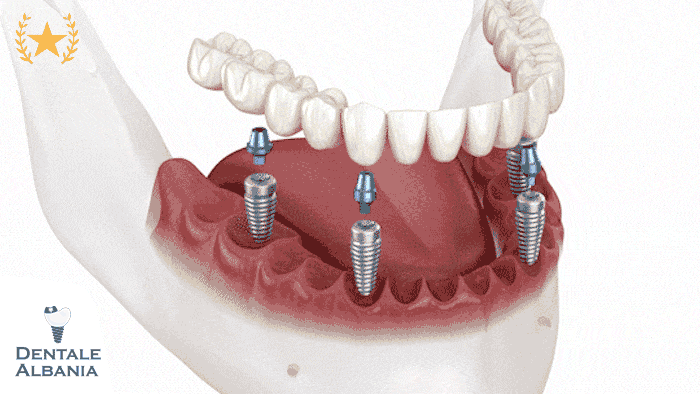Table of Contents
ToggleImplant Supported Dentures: What Are They and How Do They Work?

Implant supported dentures have emerged as an innovative and highly effective solution for individuals suffering from tooth loss. Unlike traditional dentures, which merely rest on the gums and rely on adhesives for stability, implant-supported dentures securely anchor directly to your jawbone using dental implants. This advanced technique provides superior stability and comfort, significantly enhancing a patient’s overall dental experience.
Dental implants themselves are small titanium screws surgically inserted into the jawbone. These implants replace the root structures of missing teeth, providing an extremely stable foundation for attaching dentures. Over time, through a natural process called osseointegration, these titanium implants fuse directly with your bone, creating a permanent, durable support system. Once osseointegration is complete, dentures can be securely attached to these implants, either permanently (fixed) or with the option of removal (removable dentures).
With implant-supported dentures, patients no longer experience the common inconveniences associated with traditional dentures, such as slipping or discomfort while eating or speaking. Instead, these implant-retained options offer an exceptional combination of strength, durability, and comfort, closely mimicking natural teeth and significantly improving quality of life.
What Is the Difference Between Implant Supported and Implant Assisted Dentures?
When researching denture solutions, you may encounter terms like implant supported dentures and implant assisted dentures. Though similar, these terms denote two slightly different treatment options:
- Implant Supported Dentures: These dentures depend entirely on dental implants for support, transferring biting forces directly to the implants and jawbone. Generally, implant-supported dentures require a greater number of implants, typically four to six, providing maximum stability and eliminating almost all pressure from the gums.
- Implant Assisted Dentures (Implant Retained Dentures): These dentures primarily rest on the gums and rely on fewer implants (usually two to four). Although they significantly enhance denture stability compared to traditional dentures, they still distribute some chewing forces onto the gums.
Patients seeking maximum stability, particularly for extensive tooth replacement, typically opt for implant-supported dentures. Those seeking a more affordable option with substantial but slightly less stability often choose implant-assisted dentures.
What Is the Difference Between All-on-4® and Implant Supported Dentures?
All-on-4® is another popular implant-based denture solution specifically designed for patients missing an entire arch of teeth (either upper or lower jaw). This innovative method strategically utilizes only four implants to secure an entire denture. Two implants are placed vertically in the front of the jawbone, while two more implants are placed at an angle toward the back. The All-on-4® technique allows for faster recovery and is often suitable even for patients with limited jawbone density, potentially eliminating the need for bone grafting.
In contrast, traditional implant-supported dentures might require more implants (typically four to six) placed throughout the jawbone, usually vertically positioned. Though it often involves longer treatment times and sometimes requires preliminary bone grafting, it can provide increased strength and stability in certain cases.
Choosing between All-on-4® and implant-supported dentures generally depends on individual patient conditions, such as jawbone density, budget considerations, and overall treatment objectives.
Are Implant-Supported Dentures Worth It? Benefits Explained
When considering implant-supported dentures, one of the most frequent questions is whether the benefits outweigh the costs and the effort involved. For most individuals dealing with tooth loss, the clear answer is yes—implant-supported dentures are indeed worth it. These dentures offer a multitude of advantages over conventional options, transforming not just dental health but overall quality of life.
One of the primary benefits is the significantly improved stability compared to traditional dentures. Traditional dentures often slip and shift, causing discomfort and embarrassment, especially during eating or speaking. Implant-supported dentures eliminate this concern entirely. Because they anchor securely to dental implants fused to your jawbone, they remain firmly in place, even while eating hard or chewy foods.
Additionally, implant-supported dentures help maintain jawbone density. Traditional dentures, which merely sit on the gums, fail to stimulate the underlying bone, leading to gradual bone loss. Over time, this can drastically alter your facial structure, causing a sunken appearance and prematurely aged look. Conversely, implants act like natural tooth roots, stimulating the jawbone during chewing and preventing this undesirable bone loss.
The natural appearance of implant-supported dentures also enhances confidence and self-esteem. Designed meticulously to resemble real teeth, implant-supported dentures restore both the function and aesthetics of your natural smile. Patients frequently report a renewed sense of confidence, thanks to the comfort and secure fit these dentures offer.
Can You Eat Normally With Implant-Supported Dentures?
Yes, implant-supported dentures restore natural chewing capability, allowing you to comfortably eat a wide range of foods. Unlike traditional dentures, which can move or slip, implant-supported dentures remain stable during meals. Foods previously avoided due to denture instability—such as apples, corn on the cob, steaks, and even crunchy vegetables—can easily return to your diet. With implant-supported dentures, you experience nearly the same level of function as with natural teeth, promoting better nutrition and enjoyment in daily meals.
Are Implant Supported Dentures Better Than Conventional Dentures?
Implant-supported dentures are typically considered superior to conventional dentures across multiple dimensions. Conventional dentures often require adhesive pastes, frequently slip or loosen, and can irritate the gums, making them inconvenient and uncomfortable. In contrast, implant-supported dentures remain firmly anchored, eliminating the need for adhesives and significantly reducing gum irritation.
Another critical advantage is longevity. Traditional dentures typically require replacement or realignment every 5–8 years due to jawbone and gum changes. However, implant-supported dentures can last significantly longer, often decades, with appropriate maintenance and regular dental visits.
Patients choosing implant-supported dentures often describe vastly improved comfort, stability, functionality, and confidence compared to their experiences with conventional dentures.
How Long Do Implant-Supported Dentures Last? Durability and Longevity

The durability and longevity of implant-supported dentures are major factors contributing to their popularity among patients who want a reliable, long-term solution. Unlike conventional dentures, which typically require frequent adjustments or replacement due to changes in the gum and bone structure, implant-supported dentures offer an impressive lifespan, providing great value over time.
Implant-supported dentures consist of two main components: the titanium implants themselves and the denture that attaches to these implants. The titanium implants, once fused to the jawbone through the osseointegration process, typically last a lifetime. Titanium is biocompatible and designed to integrate naturally with your bone, providing a permanent and stable base.
The denture component, generally crafted from high-quality porcelain or acrylic, usually lasts between 10 to 20 years with proper care and maintenance. Several factors influence the longevity of these dentures, including daily care habits, diet, lifestyle, and regular dental check-ups. Although implant-supported dentures are designed to endure normal biting and chewing pressures, porcelain or acrylic materials can sometimes chip or crack with misuse or accidental trauma. However, minor damage to dentures can often be repaired without needing a full replacement.
Regular dental examinations are crucial for maintaining implant-supported dentures. Professional inspections ensure that any issues, such as minor cracks or signs of wear, can be addressed promptly, prolonging denture life significantly.
How Successful Are Denture Implants?
The success rate of implant-supported dentures is remarkably high. Clinical studies consistently report success rates ranging between 95% and 98%. This impressive statistic underscores the reliability and effectiveness of dental implants as a long-term tooth replacement solution.
The success of denture implants depends primarily on the patient’s oral hygiene habits, the quality of bone present at the implant site, and adherence to recommended dental care guidelines. Additionally, regular visits to your dentist play a significant role in ensuring ongoing success by allowing early detection of any potential complications, such as implant infections or minor structural issues.
Factors that can adversely affect the success of dental implants include smoking, poorly controlled diabetes, and advanced gum disease. Dentists typically screen patients thoroughly for these factors before proceeding, significantly boosting the likelihood of long-term implant success.
In summary, implant-supported dentures are not just a temporary solution but a stable, long-lasting investment in oral health. With proper daily care, routine dental visits, and a healthy lifestyle, these dentures and implants offer unmatched durability, making them an exceptional choice for individuals looking to reclaim their oral function and self-confidence for many years.
How Are Implant-Supported Dentures Placed? Step-by-Step Procedure Explained
Understanding the step-by-step procedure for implant-supported dentures can help ease any concerns you may have about the treatment. Typically, the process involves several stages spread over a few months, ensuring proper healing, fit, and comfort.
How Long Does It Take to Get Full Implant Dentures?
The entire process to receive implant-supported dentures usually takes anywhere from three to twelve months, depending on individual factors such as your oral health status and whether preliminary procedures like bone grafting are necessary. The treatment involves multiple visits, beginning with an initial consultation and assessment, and ending with the placement of your permanent denture.
Initially, you’ll meet with your dentist or oral surgeon for a comprehensive assessment, including detailed dental imaging like X-rays or CT scans. This evaluation helps your dentist determine whether you have sufficient jawbone density to support implants or if bone augmentation is required.
How Long Do You Go Without Teeth When Getting Implants?
Patients often worry about spending significant time without teeth during the process. However, dentists typically provide temporary dentures or healing dentures immediately after the initial surgical procedure, ensuring you won’t have to be toothless during the healing period. Temporary dentures maintain functionality and aesthetics until your implants heal and permanent dentures are fitted.
What Is the Healing Time for Implant Supported Dentures?
Once your implants are surgically placed into your jawbone, the healing period known as osseointegration begins. This critical phase typically lasts around three to six months. During this time, the implants fuse securely with your bone tissue, forming a stable and robust anchor.
Patients may experience minor swelling, discomfort, or tenderness immediately after surgery, but these symptoms typically subside within a week. Proper oral hygiene and following your dentist’s aftercare instructions are crucial during this phase to ensure successful integration and avoid complications.
After osseointegration is complete, you’ll return for a second minor procedure where the dentist exposes the tops of the implants to attach small connector pieces called abutments. Your dentist then takes detailed impressions of your mouth to create customized dentures tailored to fit seamlessly over these abutments.
In the final stage, your dentist attaches your customized dentures securely to the implants. At this point, your dentures are fully functional and stable, significantly enhancing your ability to chew, speak, and smile confidently. Your dentist will provide clear guidance on how to maintain and care for your new implant-supported dentures, ensuring they remain in optimal condition for years to come.
Understanding this detailed step-by-step process helps you appreciate the advanced nature and precision involved in implant-supported dentures. Each stage is crucial for ensuring comfort, function, and long-term success, making it a highly worthwhile and effective treatment solution for patients experiencing significant tooth loss.
What Are the Disadvantages of Implant-Supported Dentures? Potential Risks and Drawbacks
While implant-supported dentures provide numerous benefits, it’s important to consider the potential drawbacks and risks involved before making your final decision. Like all surgical procedures, implant-supported dentures come with specific risks, and understanding these will help you make an informed choice.
One of the main disadvantages associated with implant-supported dentures is the initial cost. Due to the complex surgical procedure, the high-quality materials involved, and the multiple visits required for comprehensive treatment, implant-supported dentures tend to be significantly more expensive than traditional dentures. However, while the upfront investment may seem substantial, many patients find that the enhanced quality of life, durability, and reduced maintenance outweigh these initial costs.
Another important factor to consider is the requirement for adequate jawbone density. Patients lacking sufficient bone density or who have experienced significant bone loss might need additional procedures such as bone grafting or sinus lifts before implants can be placed. These preliminary procedures can add extra time and expense to the overall treatment.
Furthermore, implant surgery is invasive, meaning patients will experience some postoperative discomfort, swelling, and bruising. As with any surgical procedure, there’s a small risk of complications like infection, bleeding, nerve damage, or implant failure. However, these risks are minimal when the surgery is performed by an experienced dental professional and proper aftercare instructions are followed closely.
How Painful Are Denture Implants?
A common concern among patients is whether dental implant procedures are painful. Most patients report mild to moderate discomfort immediately following surgery, but severe pain is quite rare. The procedure itself is typically carried out under local anesthesia, ensuring that you experience minimal discomfort during the process. Afterward, your dentist will prescribe pain medication or recommend over-the-counter analgesics to effectively manage any postoperative discomfort or swelling. Most patients feel back to normal within one week after surgery.
Are Implant Dentures Uncomfortable?
Implant-supported dentures are designed for optimal comfort. However, it’s natural to experience an adjustment period as your mouth adapts to the new dentures. Initially, some patients may notice a slight feeling of pressure or fullness, especially if they previously wore conventional dentures.
Typically, these sensations diminish within a few weeks, as the oral tissues and muscles adapt to the secure fit of implant-supported dentures. Your dentist will likely schedule follow-up appointments shortly after the placement to ensure everything fits comfortably and address any early discomfort.
In general, implant-supported dentures significantly outperform traditional dentures regarding comfort, stability, and overall satisfaction. Any initial discomfort typically resolves quickly, and patients commonly express significant improvements in comfort and functionality within a short time frame.
How Much Do Implant Supported Dentures Cost in the UK? Pricing Guide

The cost of implant-supported dentures can vary significantly depending on several factors, including the complexity of your treatment, the type of implants and materials chosen, and the dental clinic’s location. In the UK, implant-supported dentures typically range from £6,000 to £12,000 per arch. Full mouth implant-supported denture treatments generally start from around £12,000 and can go upwards of £20,000 for premium materials or more complex cases involving additional procedures such as bone grafts.
When considering implant-supported dentures, it’s crucial to remember that the price encompasses not just the dentures themselves, but also diagnostic assessments, dental implants, abutments, surgical procedures, follow-up care, and potentially temporary dentures provided during the healing process. The comprehensive nature of this treatment explains why costs may initially seem high, though the longevity and quality of life improvements often justify the expense.
While the NHS generally does not cover the cost of implant-supported dentures except in rare circumstances (such as significant trauma or specific medical conditions), many private dental clinics provide financing plans. These flexible payment solutions often include interest-free credit or monthly installment options, making the treatment more accessible and affordable over time.
Why Are Implant-Supported Dentures So Expensive?
Implant-supported dentures require significant investment due to the extensive clinical expertise and high-quality materials involved. Unlike conventional dentures, implant-supported dentures necessitate surgical procedures, precision placement of implants, and extensive follow-up care, all performed by highly trained specialists.
The implants themselves are crafted from biocompatible titanium, a premium material designed to integrate with bone tissue and offer unmatched longevity. The prosthetic dentures typically consist of high-quality porcelain or acrylic specifically tailored to match your natural teeth in appearance and function. The advanced technology used in diagnostics and treatment planning, including 3D imaging and surgical guides, further contributes to the higher costs associated with these dentures.
Are Implant Retained Dentures More Affordable?
If cost is a significant concern, implant-retained dentures might offer a more affordable alternative compared to fully implant-supported dentures. Typically using fewer implants (usually two to four per arch), implant-retained dentures rely partially on the gums for support rather than solely on implants. Consequently, this reduces surgical complexity and overall expenses.
Prices for implant-retained dentures generally start at around £4,000 per arch in the UK, providing considerable cost savings for patients still looking to achieve enhanced stability and improved chewing function. While implant-retained dentures do not entirely eliminate all pressure on the gums, they represent a substantial upgrade from conventional dentures, offering improved comfort and stability at a more accessible price point.
Ultimately, the choice between fully implant-supported dentures and implant-retained dentures depends on your individual budget, oral health condition, and personal preferences regarding functionality and comfort. Your dentist will thoroughly evaluate your situation and discuss the most suitable and cost-effective solution tailored specifically for you.
How Much Do Implant Supported Dentures Cost in Albania?
Albania has rapidly become one of Europe’s most attractive destinations for high-quality yet affordable dental treatments, including implant-supported dentures. Patients from the UK, Italy, and other Western European countries often travel to Albania for their dental care, motivated by substantial cost savings, high clinical standards, and access to advanced dental technology and experienced dental specialists.
When it comes to implant-supported dentures, Albania offers significantly lower costs compared to Western European countries. The average price for implant-supported dentures in Albania typically ranges between €3,500 and €6,000 per arch, depending on the complexity of your case, the materials chosen for your dentures, and the number of implants required. By comparison, similar procedures in the UK and Italy can often cost between €8,000 and €15,000 per arch or even higher, especially if additional treatments like bone grafting or sinus lifting are necessary.
This significant price advantage is primarily due to Albania’s lower cost of living, reduced overhead expenses for dental clinics, and favorable economic conditions. Yet, despite these lower costs, Albanian dental practices consistently uphold international standards of quality and patient safety. Dentists in Albania commonly undergo extensive international training, participate regularly in European dental seminars and conferences, and employ state-of-the-art technology comparable to that found in clinics across Western Europe.
Additionally, many dental practices in Albania offer comprehensive packages designed specifically for international patients. These packages typically include not only the cost of dental procedures but also associated services such as consultation fees, digital imaging, temporary dentures, post-procedure follow-ups, and even transportation and accommodation. Such all-inclusive arrangements provide further financial savings and ensure a comfortable, hassle-free experience for traveling patients.
Moreover, Albanian dental clinics are well-versed in treating international patients, with multilingual staff, patient coordinators, and comprehensive aftercare programs, ensuring a smooth and efficient treatment journey from initial consultation to final denture fitting and follow-up appointments.
In summary, the cost advantage of getting implant-supported dentures in Albania, combined with excellent clinical standards, advanced dental techniques, and supportive patient care, makes the country an attractive choice for anyone seeking affordable yet high-quality dental solutions. This unique blend of affordability, quality, and patient-centered care has made Albania a popular dental tourism hub in Europe.
Who Is a Candidate for Implant-Supported Dentures? Suitability Criteria
Implant-supported dentures represent an advanced solution for missing teeth, but it’s essential to evaluate whether you’re a suitable candidate for this treatment. Generally, most adults experiencing significant tooth loss or those already using traditional dentures can benefit greatly from implant-supported dentures. However, several factors determine your eligibility and the overall success of the procedure.
Firstly, adequate jawbone density is critical. Dental implants require sufficient bone tissue for successful integration and support. Your dentist will use detailed imaging, including CT scans, to evaluate your jawbone’s quality and volume. If bone density is insufficient, preliminary procedures such as bone grafting or sinus lifting may be necessary to create a suitable foundation. While these additional steps can extend treatment time and increase initial costs, they ensure the implants have a stable and secure base.
Secondly, your overall oral health must be in good condition. Patients with untreated gum disease or severe tooth decay must first address these issues before proceeding with implant surgery. Healthy gums are crucial because gum disease can negatively affect the implants’ longevity and success rate, potentially leading to implant failure.
Lifestyle factors also significantly impact candidacy. Patients who smoke, for example, face increased risks during the implant procedure due to slower healing times, compromised blood flow, and higher susceptibility to infections. Similarly, individuals with poorly controlled diabetes or autoimmune disorders might experience complications with the healing and integration processes. However, controlled diabetes and well-managed chronic conditions typically do not prohibit treatment.
Age itself is generally not a limiting factor for implant-supported dentures, provided the patient is in good health. Many seniors successfully undergo the procedure and report a significant improvement in their quality of life.
Finally, patient commitment is a crucial component of successful treatment. Implant-supported dentures require excellent oral hygiene practices and regular dental visits. Adhering to recommended dental care routines and ongoing maintenance significantly enhances treatment outcomes, making commitment and willingness to follow post-operative instructions essential criteria for candidates.
Before proceeding with implant-supported dentures, your dentist will thoroughly evaluate your oral health, medical history, jawbone density, and lifestyle factors. Together, you’ll decide if implant-supported dentures represent the best solution for your needs, ensuring long-lasting results and improved oral function.
How to Care for Your Implant-Supported Dentures: Maintenance and Aftercare Tips
Proper care is essential to maximizing the longevity and functionality of your implant-supported dentures. While they’re remarkably durable and reliable, diligent oral hygiene and routine dental visits are crucial to maintaining their appearance, health, and overall comfort over the years.
The good news is that caring for implant-supported dentures closely resembles caring for natural teeth, with a few additional considerations. Whether your implant-supported dentures are removable or fixed, maintaining excellent oral hygiene practices will significantly contribute to their long-term success.
Do You Have to Remove Implant-Supported Dentures?
Implant-supported dentures come in two main types: removable and fixed (non-removable). Removable implant-supported dentures “snap” onto the implants and can be taken out daily for thorough cleaning. These dentures require removal at least once daily to properly clean both the prosthetic and the gum area underneath, ensuring food debris and bacteria don’t accumulate and cause gum irritation or infection.
Fixed implant-supported dentures, however, are permanently attached and cannot be removed by the patient. Only a dentist can remove these for professional cleaning or adjustments. These dentures are brushed and flossed like natural teeth, often utilizing special tools such as water flossers, interdental brushes, or floss threaders to clean around and under the denture thoroughly.
Can You Sleep in Implant-Supported Dentures?
Patients with fixed implant-supported dentures naturally sleep with their dentures securely in place. However, for patients with removable implant-supported dentures, most dentists advise removing dentures overnight. This practice allows your gums and oral tissues a rest period from continuous pressure, promoting optimal gum health. Overnight removal also provides a convenient opportunity to soak the dentures in a denture-cleansing solution, ensuring they remain bacteria-free and hygienic.
Key Aftercare and Maintenance Tips
- Regular Brushing: Brush dentures thoroughly at least twice daily, using a soft-bristled toothbrush and non-abrasive denture cleanser or toothpaste specifically formulated for dentures.
- Flossing and Interdental Cleaning: For fixed dentures, use floss threaders, interdental brushes, or water flossers to effectively clean around implants and beneath the dentures. For removable dentures, gently clean the gums, tongue, and palate once the denture is removed.
- Routine Dental Check-ups: Visit your dentist regularly—usually every six months—to ensure the implants and dentures remain in good condition. Regular dental check-ups help identify any potential issues early, ensuring any minor damage is addressed before it progresses.
- Avoid Harmful Habits: Avoid biting into excessively hard or sticky foods, as this can cause unnecessary wear or damage. Refrain from using your dentures for opening packages or chewing non-food items, as these habits can lead to breakage.
- Professional Cleanings: Periodic professional cleanings at your dental office help maintain the appearance of your dentures and prevent stubborn staining, ensuring they continue looking as natural and appealing as possible.
By following these aftercare recommendations, you can ensure your implant-supported dentures remain comfortable, functional, and aesthetically pleasing for years, significantly enhancing your overall oral health and quality of life.
Frequently Asked Questions About Implant-Supported Dentures

How Long Do Implant-Supported Dentures Last?
Implant-supported dentures are designed to provide a long-lasting and durable solution for missing teeth. The titanium implants that secure the dentures to the jawbone typically last a lifetime once they’ve successfully fused to the bone through the osseointegration process. These implants are incredibly resilient and rarely require replacement.
However, the denture component, made from acrylic or porcelain, usually has a lifespan of around 10 to 20 years, depending on how well they’re cared for. Regular maintenance, proper oral hygiene, and routine dental visits are essential for maximizing their longevity. Factors such as diet, lifestyle habits, and general oral health also significantly impact how long the denture component lasts.
Overall, with excellent care, implant-supported dentures offer a reliable, stable solution that can maintain optimal functionality and aesthetics for decades.
Are Implant-Supported Dentures Better Than Conventional Dentures?
Implant-supported dentures offer numerous advantages compared to conventional dentures, making them the superior option for most patients experiencing extensive tooth loss. The key difference lies in stability and comfort. Traditional dentures rest directly on the gums and often rely on adhesives, making them prone to slipping, shifting, and causing gum irritation or discomfort.
In contrast, implant-supported dentures are securely anchored to dental implants embedded in the jawbone, providing exceptional stability and significantly enhancing comfort. This stability allows individuals to eat a wider variety of foods confidently, including those traditionally avoided with conventional dentures.
Additionally, implant-supported dentures promote better oral health by stimulating the jawbone, preventing bone loss and preserving facial structure. Conventional dentures do not provide this stimulation, potentially leading to facial sagging and premature aging appearance over time.
While conventional dentures initially may seem more affordable, the frequent adjustments and replacements needed over the years may actually result in higher long-term costs. Implant-supported dentures, although requiring a larger initial investment, offer significantly greater long-term value, comfort, and improved quality of life.
Ultimately, for patients seeking reliability, comfort, improved oral health, and enhanced confidence, implant-supported dentures are generally considered a superior and more rewarding solution compared to conventional dentures.









